
Local Pre-schoolers Visit Dyke Marsh
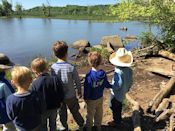
Forty pre-schoolers from St. Luke's Episcopal Church Day School, Mount Vernon area, visited the Dyke Marsh Wildlife Preserve on May 8, 2017, with their teachers. The youngsters had a scavenger hunt and looked for birds, shells, gum balls, paw prints, cattails and critters.
D.C. Middle Schoolers Visit Dyke Marsh
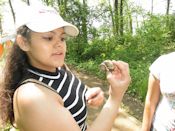
Thirty youngsters from Washington, D.C., Inspiring Connections, all students at Caesar Chavez Public Charter School for Public Policy and their three D.C. Sierra Club chaperones, learned all about freshwater wetlands and the flora and fauna of the Dyke Marsh Wildlife Preserve on April 29.
Planting Natives in Dyke Marsh
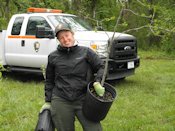
On a damp, overcast, 55-degree morning, eight volunteers and two National Park Service staffers planted 50 native shrubs and trees along the Haul Road in Dyke Marsh in the section of the wetland between the “dogleg” and the boardwalk. Most of the plants are facultative, meaning edge plants or plants that grow in wetlands but can survive in non-wetlands.
Raptors Enrapture Once Again
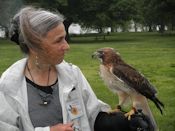
Despite gray skies and a steady drizzle, around 200 raptor fans -- young, old and in between -- enjoyed FODM’s annual Raptor Rapture on April 22, 2017, in Belle Haven Park. Liz and Tim Dennison from Secret Gardens, Birds and Bees brought a red-tailed hawk (Buteo jamaicensis), a barred owl (Strix varia) and a great horned owl (Bubo virginianus), all “rescue birds.”
Three-hour Trash Cleanup, 80+ Bags
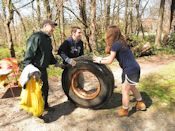
On April 8, 60 dedicated volunteers collected around 80 bags of trash in the Dyke Marsh Wildlife Preserve, Belle Haven Park, Belle Haven Marina and along the GW Parkway trail and the Potomac River shoreline from 9 a.m. to 12 noon. Items included cigarette butts, bottle tops, plastic bottles, whiskey bottles, a fishing rod, a soaked sleeping bag, two rubber tires (one from a tractor trailer truck), fast food debris, various balls and much Styrofoam and miscellaneous plastic.
Barred Owl Pair Has Established Breeding Territory
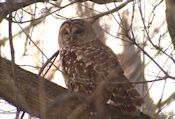
FODM surveyors believe that a barred owl (Strix varia) pair has set up a breeding territory near the Belle Haven Park picnic area this spring (2017). According to FODMer Larry Cartwright, barred owls select a breeding territory based on suitability for nest sites and prey base, partly to monopolize food sources and partly to prevent another male from attempting to break the pair bond.
Students Visit Dyke Marsh
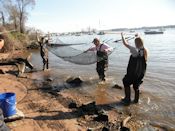
Under beautiful spring skies, 40 eighth graders and their teachers from Alexandria’s St. Stephens and St. Agnes School visited Dyke Marsh on April 5, 2017, under the leadership of their science teacher Robert Davis, Middle School Science Department Coordinator. Using a seine net, students collected and studied fish and other aquatic life.
FODMers Survey Virginia's Breeding Birds
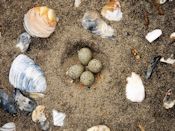
Several FODMers are helping with Virginia’s second Breeding Bird Atlas, a survey of all bird species breeding in the state. Headed by Dr. Ashley Peele, a Virginia Tech avian ecologist, the project is featured in a March/April 2017 Virginia Wildlife magazine article by FODM President Glenda Booth and titled “On the Hunt for Virginia’s Breeding Birds.” You can read it online here.
The Ospreys Have Returned
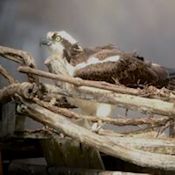
On March 7, 2017, we welcomed the return of ospreys (Pandion haliaetus) to the Dyke Marsh Wildlife Preserve. Ed Eder reported that “the female quickly began rearranging sticks on the nesting platform” at the Belle Haven Marina. “She directs the construction although the pair both gather nesting material,” Ed observed. Ed, an expert naturalist and birder, said that the male has used this platform for nearly 10 years.
FODMers and Friends Learn about Secretive Birds
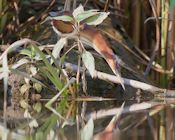
On February 26, 2017, Patrice Neilsen gave a presentation on her research on secretive bird species of the Washington, D.C., region. She studied the king rail, Virginia rail, sora, least bittern and American bittern in surveys at 51 points in 25 marshes in 2013, 2014 and 2015. She surveyed at sunrise or sunset three times a year. She found no Virginia rails, sora or American bittern, but found least bitterns and king rails in several locations.
Carolina Wrens Delight
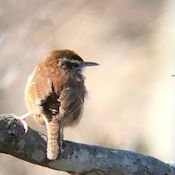
Carolina wrens (Thryothorus ludovicianus) delight us year-round with their rich musical song. They are common in surburbia and in the undergrowth of deciduous and mixed woods and along forest edges. Jason Yee shared his photographs of these beautiful birds, photos he took on the February 5, 2017, FODM bird walk.
Celebrating FODM’s 40th and NPS’s 100th
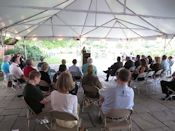
On October 2, 2016, 125 friends and supporters of the Dyke Marsh Wildlife Preserve (photo by Ned Stone) celebrated the 40th anniversary of the Friends of Dyke Marsh, the 100th anniversary of the U.S. National Park Service and the start of marsh restoration. FODM thanks the many generous members, friends, volunteers, sponsors and donors who made the celebration possible. See the lists below.


AlbertHerring-b4cc6b5cfb.jpg)



 Friends of Dyke Marsh, Inc. is a non-profit 501(c)(3) organization.
Friends of Dyke Marsh, Inc. is a non-profit 501(c)(3) organization.